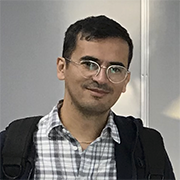A .gov website belongs to an official government organization in the United States.
A lock () or https:// means you've safely connected to the .gov website. Share sensitive information only on official, secure websites.

The cloud microphysical processes that mediate storm thermodynamics and produce precipitation are beset with profound uncertainties. At the heart of these uncertainties is the fact that no reference model exists at any scale – few cloud/precip particle interactions are understood with any certainty – and so real-world observations likely will provide crucial guidance for the foreseeable future. Observations of clouds and precipitation, meanwhile, are sparse, have uncertain biases and noise, and may have representativeness error with respect to model prognostic variables. The problem of learning microphysics from observations should therefore be posed as one of Bayesian inference, where all quantities are characterized probabilistically in accordance with their respective uncertainties. Bayesian parameter estimation, as performed by Markov Chain Monte Carlo samplers, is a powerful tool to constrain uncertainty for problems that may have strongly nonlinear sensitivities (such as microphysics). Recent research uses these methods to improve model performance and microphysical understanding in detailed ice microphysics schemes using polarimetric radar, and also in the GISS ModelE GCM using global satellite data. Despite these successes, parameters are not the only source of uncertainty, and in some cases model structural errors appear to dominate. To address these issues while retaining a physically-based model, we have developed a microphysics scheme whose structure can be systematically and flexibly adjusted called the Bayesian Observationally-constrained Statistical-physical Scheme (BOSS). I will discuss how BOSS can be used to probabilistically unify insights ranging from the laboratory scale to global observations provided by state-of-the-art satellites, and the role that machine learning can play in this endeavor.
Marcus Van Lier-Walqui is an Associate Research Scientist at NASA GISS and Columbia University in New York City. He received his PhD in Meteorology and Physical Oceanography from the Rosenstiel School of Marine and Atmospheric Science in Miami, Florida, as well as a MA in Physics and a BA in Philosophy, both from Wesleyan University. His work focuses on using advanced cloud and precipitation observations to gain insights and quantify uncertainty in cloud microphysical processes, often via systematic Bayesian inference. He is a co-investigator on the upcoming DOE TRACER field campaign and is involved in model tuning efforts for the NASA ModelE and GEOS models, CESM, and E3SM.
ALL Seminar attendees agree not to cite, quote, copy, or distribute material presented without the explicit written consent of the seminar presenter. Any opinions expressed in this seminar are those of the speaker alone and do not necessarily reflect the opinions of NOAA or CSL.